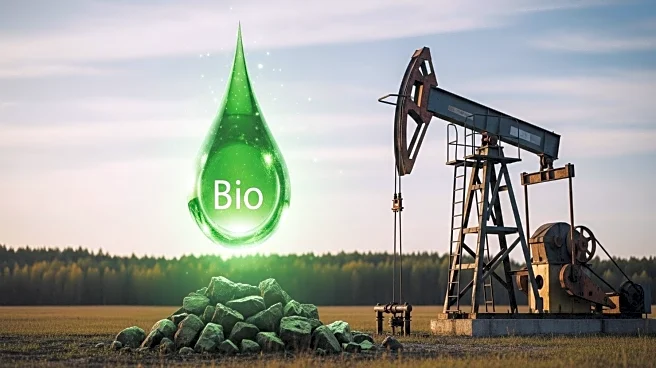What is the story about?
What's Happening?
Researchers at Iowa State University have conducted a study on the use of bio-oils to plug abandoned oil wells. Led by Professor Mark Mba-Wright, the study explores the potential of using bio-oils, derived from plant waste through pyrolysis, as a sustainable solution for sealing orphaned oil wells. This approach not only addresses environmental concerns by sequestering carbon dioxide but also offers economic opportunities for utilizing farm and forest waste. The study, in collaboration with Charm Industrial, suggests the development of mobile pyrolysis units to process biomass on-site, creating bio-oil and biochar. These units could significantly contribute to carbon sequestration efforts and provide new revenue streams for farmers.
Why It's Important?
The research highlights a novel application of bio-oils that could transform waste management and carbon sequestration practices. By using agricultural residues like corn stover, the initiative could reduce carbon emissions and enhance soil health through the byproduct biochar. This method presents a cost-effective alternative to traditional carbon capture technologies and could stimulate economic growth in rural areas by creating new markets for crop residues. The study's findings could influence policy decisions and encourage investment in sustainable technologies, aligning with broader environmental goals.
What's Next?
The research team and Charm Industrial are in discussions to further explore the scalability of mobile pyrolysis units. Future research may focus on optimizing the technology and assessing its long-term economic viability. Policymakers and industry stakeholders may consider supporting such initiatives to promote sustainable practices and reduce the environmental impact of abandoned oil wells. The success of this project could lead to wider adoption of bio-oil technologies and inspire similar innovations in other sectors.
Beyond the Headlines
The use of bio-oils for plugging oil wells raises important questions about the integration of renewable resources into traditional industries. This approach could redefine waste management practices and highlight the potential of bio-based solutions in addressing environmental challenges. The collaboration between academia and industry exemplifies the importance of interdisciplinary efforts in advancing sustainable technologies.

















